Month 9:15, Week 2:7 (Shibi'i/Sukkot), Year:Day 5939:252 AM
2Exodus 2/40, 4th Sh'mittah - Year 49/50
Global Judgment - Day #T-47
Gregorian Calendar Thursday 26 November 2015
Second Exodus Lineup
II. Moses and the Twelve Moses-Men
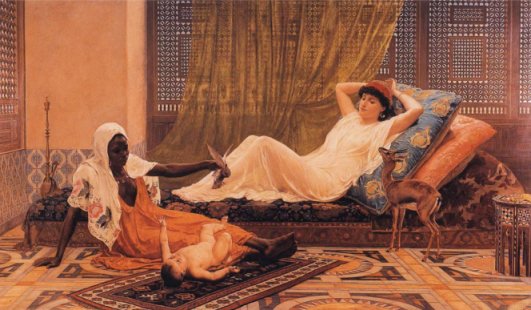
Continued from Part 1
Introduction
Shabbat shalom mishpachah and may the presence of our Master Yah'shua (Jesus) grace us as we resume our examination of the elements and personalities of the Second Exodus. We have four 'major' and several 'minor' characters to look at. I am not sure we'll be able to cover them all in one session so my main focus will be on Moses.
Moses' Skill-Set and Character Traits
As you carefully study the account of Moses' life there are certain character-traits and skill-sets - partly inherited, partly developed - that were obviously essential for the job Yahweh called him to which will be needed by the end-time Moses-men too. Born of Levite parents of the large Kohathite clan (Ex.6:16ff) after Pharaoh's extermination order against all male infants, Moses' life was in danger from the very beginning. His deliverance was by all accounts an extraordinary one. Rather than allow her child to be drowned, his mother set him in the Nile shallows where he was discovereed by Pharaoh's daughter who raised her as her own son with her birth mother as wet nurse (Ex.1:22-2:10).
Prophetic Types in the Basket of Reeds and Sea of Reeds
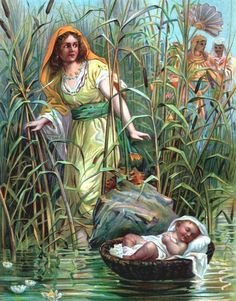 This incident is of prophetic interest because it anticipates future events: as Pharaoh designs to drown Israel's helpless boys in the reedy Nile from which Moses is rescued, to Yahweh and Moses will save Israel from Egypt at Yam Suf or the Reed Sea where Egypt's mighty men perish. Pharaoh's daughter, though a minor character in the story-line, thus symbolises Elohim (God) and her maidservant corresponds to Moses. Even Moses' name - Moshe - if understood properly in Hebrew, ought to mean - not 'rescued (drawn out) from the water' but 'rescuer from the water', foreshadowing Moses' rŰle in Israel's deliverance:
This incident is of prophetic interest because it anticipates future events: as Pharaoh designs to drown Israel's helpless boys in the reedy Nile from which Moses is rescued, to Yahweh and Moses will save Israel from Egypt at Yam Suf or the Reed Sea where Egypt's mighty men perish. Pharaoh's daughter, though a minor character in the story-line, thus symbolises Elohim (God) and her maidservant corresponds to Moses. Even Moses' name - Moshe - if understood properly in Hebrew, ought to mean - not 'rescued (drawn out) from the water' but 'rescuer from the water', foreshadowing Moses' rŰle in Israel's deliverance:
"Then he remembered the days of old,
Moses and his people, saying:
'Where is He who brought them up out of the sea
With the shepherd of His flock?'"
(Isa.63:11, NKJV).
Prophetic Incidences in the Latter-Day Moses-Men
Yahweh's end-time Moses-men of the Second Exodus will have lives rich in prophetic symbolism which will only become fully apparent as events unfold during that Exodus and in their lives. Their stories will each be different, of course, their 'Pharaoh's' presidents, kings and other modern leaders. Stories will be told of miraculous deliverances from death that will, in their form, also depict the rescuing they themselves will one day lead. Their mothers or guardians will play key rŰles involving sacrifice that leads to unexpected blessings. As it was with Moses' mother Jochebed and with Samuel's mother Hannah, so it may well be with the mothers of the latter-day Moses-men.
A Royal Education
Events under the supervision of the Almighty combined to ensure that the son of a slave would have the best education available at the time. Under ordinary circumstances Moses would probably have remained semi-literate but as a prince in the household of Egypt, he almost certainly had private tutors who instructed him in all that was known about languages, science, medicine and of course religion. This alone set him apart from all his fellow Israelites. And as a prince and soldier he would also acquire leadership and military skills.
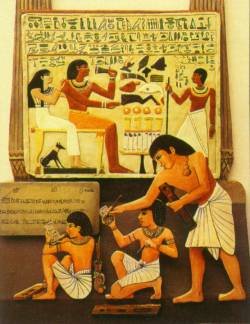 An Egyptian education
An Egyptian education
A Military Campaign Against Meroë
And, of course, he also obtained a wife - his first one - of similar upbringing, an Ethiopian princess who, according to Jewish oral tradition, hailed from Meroë (today the Arab Meruwi), formerly the capital of the Kingdom of Kush, on the east bank of the Nile in what is now modern Sudan. The city, which was governed by a renegade king, was built near the confluence of two great rivers and was encircled by a formidable wall. To ensure the safety of his men who traversed that desert country, Moses had invented a strategem whereby the Egyptian army would carry along with them baskets of sedge (a grasslike plant growing on wet ground), each containing an ibis (a wading bird) which were to be released when they approached the enemy's country. The purpose of the birds was to kill the deadly snakes that lay all about that country.
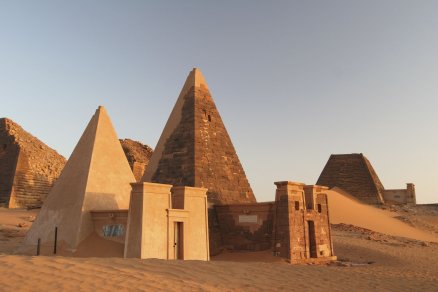 The Remains of MeroëŽ Today
The Remains of MeroëŽ Today
A Royal Cushite Wife for Moses
Having successfully laid siege to the city, it was eventually subdued by the betrayal of the king's daughter, Tharbis, who had agreed, under the solemn assurance of an oath, to deliver the city to Moses on condition that he would marry her, which he did. Many decades later, after Moses' 40 year soujourn in Midian and second marriage to Zipporah, a complaint was made against Moses' first Cushite wife by his sister Miriam, so we may reasonably conclude that she left Egypt along with the rest of the House of Israel and lived with Moses again under more humble circumstances. Yahweh did not sustain Miriam's complaint, as we know from the punishment of leprosy decreed on her, but we shall return to this subject again later in the context of Moses' family household.
The Noble and Spiritual Disposition of Moses
Let's return to the extraordinary upbringing of this son of a Hebrew slave. What kind of a figure did he cut? According to Luke, he was "a noble-looking child" (Acts 7:20, N.T.Wright - KNT) and "educated in all the wisdom of the Egyptians and was powerful in speech and action (deeds - AENT)" (v.22, NIV). And you might have thought - what an advantage! Surely this will give him an edge. Nobility is in the spirit and Moses possessed that so that it was apparent to all that he had an elevated spiritual disposition. Sadly, because the Israelites were so carnal, Moses' nobility, character (even after his later tempering in Midian) and skill set didn't mean much to the carnal, Egyptianised Israelites. Thus Moses "thought his kinsfolk would grasp the fact that Elohim (God) was sending him to their rescue, but they didn't" (v.25, KNT).
Tare and Wheat Moses-Men
Here is the problem for the end-time Moses-men. They're not recongised in the Ruach (Spirit) by others who don't have the Ruach (Spirit) who think they do but who are operating in the Adamic psyche-nature. Yahweh's Second Exodus Moses-men will therefore remain invisible, save to the spiritual, until they demonstrate that Yah's power is in them at which point, of course, all the false claimants to the calling, full of boastful words as they are, will disqualify themselves as their impotence is seen by all. So be aware that there are Wheat-Moses-men and Tare-Moses-men and that the two will be separated out at the ripening. Unless you have keen discernment you will not likely be able to see the difference which is why the unripened elect will often be deceived a while. Ripened fruit attracts ripened fruit and they will soon kick out the rotten apples so as not to spoil the basket.
Pharaoh's HarÓms
What else was Moses exposed to during his upbringing in Egypt, before his flight to Midian? The pharaohs of the New Kingdom period (~1570-1085 BC) maintained residences and harÓms not only in the great capitals of Thebes, Memphis and Pi-Raamessť (Ra'amses) but also in other parts of Egypt, especially in pleasure-resorts. Typical of these was the long established harÓm in the Fayum, a marshland region at the time much favoured by the pharaohs for fishing and bird-shooting expeditions. Papyrus documents reveal that this harÓm was no prison of enforced idleness for its inmates in pharaoh's absence; the royal ladies supervised a hive of domestic industry, spinning and weaving done by servants [1]. Distinguished ladies might be found in such a harÓm, such as Maa-Hor-neferu-Rť, a Hittite princess married to Ramses II, mentioned by the Fayum records. However, the regular inmates would be mainly royal concubines and 'favourites' of lesser rank and origin, and the "daughter of Pharaoh" (Ex.2:5) who adopted Moses would be the adolescent offspring of a king by one of these and not one of the chief princesses of the full blood royal, hieresses to the kingdom, who are much more prominent in the available records than their more obscure half-sisters.
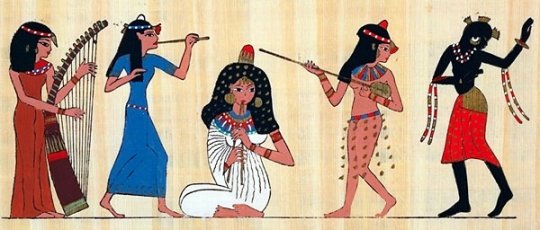
Moses' Experience With Egyptian Polygamy and Miriam's Objection
You do not grow up in such an environment without it impacting you in some way. His experience in Egypt would have given him much to reflect on later as a shepherd in Midian of considerably reduced status and circumstances. Yahweh would later endorse his polygamy in the face of criticism from his sister. What Miriam's objections precisely were is impossible to know for sure - people have speculated that it was because Tharbis, the Princess of MeroëŽ was black or that she was a pagan (a possibility though she could have converted). Western commentators, scriptorians and theologians, with their monogamy-only bias, have speculated that polygamy was the issue which is highly unlikely as it is not only known that plural marriage was widespread in Israel but that it is sanctioned in Torah provided it is done in moderation and according to a man's spiritual and material means. Moses the thinker must, at several points in his life, have contrasted Yahweh's regulations on the practice with his experience in the Egytian harÓm that had been a part of his daily experience, and mentally sifted out the good from the bad.
 How Moses' First Cushite Wife, Tharbis, Princess of Meroë, May have Looked
How Moses' First Cushite Wife, Tharbis, Princess of Meroë, May have Looked
Moses' Two Wives and the End Times
At any rate we know that he had a noble African Cushite wife and a Midianite shepherd's daughter which must have provided for some colourful contrast in his household. Polygamy has surfaced in our day in both the evangelical and messianic communities and caused no small amount of controversy and spiritual blood-letting. Certainly, because it is a part of the Torah and of end-time prophecy (Isa.4:1), it has to properly factor into the end-time equation of Messianic Israel and the Moses-men - both the authentic and the counterfeits - will have to handle it, and will deal with it in radically different and contradictory ways. And like all things that Satan imitates and corrupts, there will be both authentic and counterfeit forms of it.
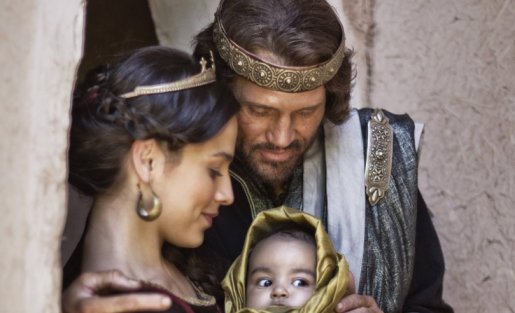 Moses and his Second Midianite Wife Zipporah with Son Gershom
Moses and his Second Midianite Wife Zipporah with Son Gershom
The Extent of Moses' Education
Anciently, children of harÓm-ladies could be educated by the Overseer of the harÓm (called 'a teacher of the children of the king'). In due course princes were given a tutor, usually a high official or a retired military officer close to the king [2]. Almost certainly Moses faired similarly. Egyptian education included reading and writing in the hiergylyphic and hieratic scripts, the copying of texts (especially classical literature), instruction in letter-writing and other administrative skills. Royal princes were trained also in archery and other physical attainments. Princes found various employments for their skills - in the armies of the pharaoh, superintending great building projects, holding priestly office in important provincial temples, or even as administrators of crown or temple estates. If Jewish tradition is reliable, it would seem that Moses served in the army and during one campaign in modern-day Sudan obtained his first wife, a 'Cushite' or 'Ethiopian', whose name we do not know.
Moses' Use of the Proto-Canaanitic Script
As a Semite, Moses would have had no difficulty whatsoever in learning and using the twenty or so letters of the proto-Canaanite linear alphabet, especially if he had been submitted to the much more exacting discipline of a training in the scores of characters and sign-groups of the Egyptian scripts (though even these only require application, not genius, to learn them). The fact that Egypt, not Palestine, was his home would be no barrier to familiarity with this simple linear script in which the Torah would come to be written by him and in which Yahweh must have written the original Ten Commandments with His own finger. The proto-Sinaitic inscriptions of the early 15th century BC are informal dedications, work-notes and brief epitaphs (for offerings) by Semitic captives from the Egyptian eastern Delta (or Memphis settlements) employed in the turqoise mines [3] and illustrate free use of that script by Semites under Egyptian rule nearly two centuries before Moses.
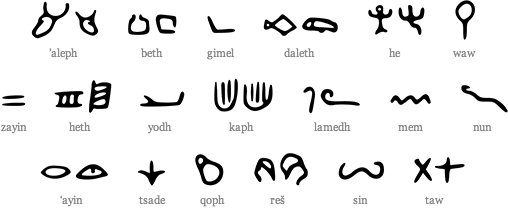
Moses Did Not Write in Modern Hebrew Block Script
If mere workmen (or their foremen) at Theban tomb-sites and Sinai mines had no inhibitions about using this script for mundane lists and religious memorials, then it is perfectly reasonable to suggest that the eventual leader of an embryo nation, especially one conditioned in Egyptian attitudes to the written word, would come to use it as the alphabet of the Hebrew language and for the recording of Yahweh's Law in the wilderness. This script was not the block-script of modern Hebrew, but a pictographic one replete with revelation all of its own. It is for this reason that I reccomend William H. Sanford's The Complete Messianic Aleph-Tav Scriptures - Paleo-Hebrew Edition [4].
The Semites of the Egyptian New Kingdom
Semites and Asiatics like Moses could be found at every level of Egyptian society in the New Kingdom. Besides thousands of prisoners brought from Canaan to be slaves, foreign artisans, Syrian warriors in Egyptian service, Asian youths as attendants, fanbearers, etc., at court, Semites in Egypt could rise to the highest levels of the social pyramid. They were couriers between Egypt and Syria, carioteers who themselves owned servants, and merchants. Thus the daughter of a Syrian sea-captain Ben-'Anath could marry a royal prince [5]. But above all, some reached positions of high influence and responsibility in the state and its administration.
Comparisons With Our Time
Egypt of the New Kingdom period was not at all unlike the multiculturalism of North America, Europe, South Africa and Australasia today. It was multi-religious too. In the Egypt of Moses, Canaanite and other Asiatic deities were accepted, And as well as nuMerous loan-words, Canaanite literary themes were current, either borrowed or assimilated to Egyptian ones. Some Egyptian officials prided themselves on being able to speak the language of Canaan as well as in knowing its geography, not to mention those who had to learn Babylonian cuneiform for diplomatic purposes.
The Man for the Job
This is a very abbreviated sketch of Moses' complex cultural background against which the career of Moses must be set. Similarly, the end-time Moses-men will be coming out of neo-pagan and multi-cultural backgrounds as the world becomes homogenised and the global village expands. What should be clear from all of this, I hope, is that the upbringing and training of foreigners, especially Semites like Moses, in harÓms and at Court, and their employment in posts of confidence (like royal tutors) and responsibility (like governors of major provinces), show that the royal upbringing of Moses recorded in Exodus 2:10a would be nothing exceptional, but was, in fact, characteristic for New Kingdom Egypt, a strong validation of the Torah account, incidentally. It is clear that Moses had the kind of intellectual training in Egyptian scripts, literature and administrative method that he would be free to use in his native Hebrew tongue and simple Semitic linear script that would serve him well in the calling Yahweh had for him as Israel's navi (prophet), administrator and deliverer. We may with some justification assume that Yahweh's end-time Moses-men will need the same or similar kinds of training that will suit them for their tasks as nevi'im (prophets), administrators and deliverers too.
Unprepared and Ungrateful Israel
The young Prince Moses, in spite of his sheltered and privileged position, felt for his labouring brethren (cp. Ac.7:24) and killed an Egyptian overseer whom he found beating a Hebrew (Ex.2:11ff.). The man he was rescuing was not only ungrateful but resentful:
"The [Israelite] man said, 'Who made you ruler and judge over us? Are you thinking of killing me as you killed the Egyptian?' Then Moses was afraid and thought, 'What I did must have become known'" (Ex.2:14, NIV).
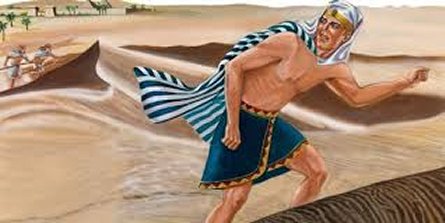 Moses Flees from Egypt to Midian
Moses Flees from Egypt to Midian
The High Cost of a Hasty Outburst of Righteous Indignation
One of the weakness of all would-be leaders is the tendency to impatiently get ahead of themselves. Joseph was no difference in his youth and his naÔvitť cost him his freedom because his tactless matter-of-factness provoked the jealous ire of his elder brothers. Even though Moses felt a heart-connection to his people, it was not reciprocated. Indeed his privileged position was resented as he was not existentially one with them in their suffering. He thought he could use position and power to help, but positioning in the kingdom of men and the power of the flesh is not the way Yahweh works. Yes, things can get 'done' by these carnal means but the hearts of men are not changed thereby, at least not in a spiritual sense. Moses' fit of passion not only failed to win the sympathy of his countrymen but - as Yahweh knew it would, and intended from the start - would endanger his whole position at Court:
"When Pharaoh heard of this, he tried to kill Moses, but Moses fled from Pharaoh and went to live in Midian..." (Ex.2:15, NIV).
The Building Tools of Yahweh's Kingdom
Yahweh uses all kinds of people in His Kingdom and gifts them accordingly. But such gifts as intellect, physical prowess, or favoured position in the world system are not the means Yahweh uses to build His Kingdom. His Kingdom is built exclusive by His Ruach (Spirit), not by human strength and wisdom:
"'Not by might nor by power, but by My Ruach (Spirit),' says Yahweh of hosts" (Zech.4:6, NKJV).
Of Princes and Shepherds
King David began as a humble shepherd, Moses began as a Prince and a General and had to be made into a humble shepherd before he could become a Prince again...a Prince of Elohim (God). Abandoning his Cushite wife and any children he might have had with her (we don't know for sure if he did), Moses fled east over the border to Midian for safety (Ex.215ff.), an escape route used by Sinuhe 600 years earlier and by runaway slaves later in the 13th century BC. His noble- and gentleman-like qualities are seen when he helped the daughters of a Midianite shepherd-priest, Reuel or Jethro, to water their flocks. For forty long years a new man had to be fashioned as only the rugged and primitive (by Egyptian Court standards) Midianite-kind of environment could. There he took a second wife, Zipporah, and had a son, Gershom (Ex.2:16-22). During his long sojourn in that barren wilderness, while keeping Jethro's sheep, he gained a knowledge of Sinai and Midian that would become invaluable in later days. Pharaohs came and went.
From Privilege to Humble Circumstances
All of Yahweh's end-time Moses-men must make the change from privilege and position in the world and eek out a humble existence in the kind of environment where they will be called to serve in the future as leaders of men, women and children out of the Babylonian system and back to the Promised Land from wherever they may be on the globe. Moses had to learn about Sinai and Midian first.
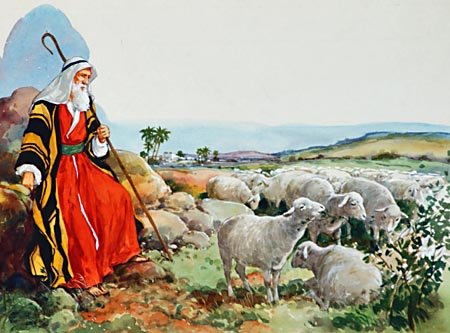 Moses as a Humble Shepherd in Midian
Moses as a Humble Shepherd in Midian
What Today's Moses-Men Must Know and Contend With
Today's and tomorrow's Moses-men must know the 'terrain' of the world too. They must understand politics and science. They must see through the deceptions and conspiracies. They must know how to deal with demons, nephilim, hybrids, robots, androids, space weaponry, electro-magnetically propelled vehicles (UFOs) able to move in and out of dimensions, microchipping, and indeed all the latest and most bizzare weaponry. They must know how to lead a band of people through a 'wilderness' radically different from the one Moses had to contend with. The 'Amalekites' in this wandering will not be coming at them with swords, spears and arrows, but with the whole gammut and arsenal of modern sophisticated weaponry. They will need to know how to deal with wormholes, the bending of time, transmaterialisation, sound, light and other kinds of weapons. Their training must be thorough and comprehensive. For the Second Exodus will be quite unlike the First one. Just having some theology under their belt and having the gift of the gab in the pulpit won't even get them more than a few inches beyond the start line.
Matured in the Middle of Nowhere
Yahweh used a man trained in Egyptian skills and tempered him over the long years in the silent grandeur of the wilderness (Ac.7:19ff.). The latter-day Moses-men must likewise be matured in the middle of nowhere with the very basics so that they can one day lead peoples in the middle of nowhere with the very basics. That is why we have been given this time especially, with imminent financial and social collapse, to teach them how to survive with little and learn to trust in Yahweh for provision, something unlearnable in a Royal Court or in an Illuminati underground city stocked with everything needed for comfort. The end-time Moses-men cannot be Solomons born with silver spoons in their mouths with too much time with which to idle and with its temptations to fall into serious sin.
Overcoming Procrastination
Like Moses, these end-time leaders must have burning-bush experiences and receive their call directly by Yahweh's own Mouth, in the way that our ancestors Abraham, Issac and Jacob were called (cp. Gen.25:1-6). And like Moses, they must learn to overcome procrastination and obey the call even if it terrifies them, even if they want to shrink back from the responsibility of it (Ex.3-4).
Family Troubles for Moses and Criticism of His First Marriage
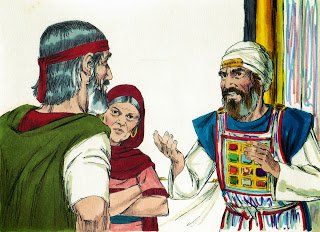 Coming under the negative infulence of rough-and-ready wife Zipporah, Moses neglected to circumcise one of his sons, and had to be threatened with death by Elohim (God) for his refusal to be obedient. Then had to contend with an angry and rebellious wife who accused him of being a "bridegroom of blood" (Ex 4:25, NIV). This is a sober reminder to the latter-day Moses-men that the Midian Experience also involved trial, tribulation and conflict even within the family. It is easy to neglect ones responsibilities in a slow, laid-back rural setting and to then meet hostility in the family when you try to put it right. The families of the Moses-men have a lot of correcting to do both of themselves and of their wives and children. Circumcision may not be binding on us in the New Covenant but plenty of others things are. Moses had to be corrected, Zipporah had to be corrected, Miriam had to be corrected, Aaron had to be corrected (see illustration above of Aaron and Mirian faulting Moses for his Cushite wife). The final gathering will not be a piece of cake and it is absolutely not going to be a joy-ride for the Moses-men.
Coming under the negative infulence of rough-and-ready wife Zipporah, Moses neglected to circumcise one of his sons, and had to be threatened with death by Elohim (God) for his refusal to be obedient. Then had to contend with an angry and rebellious wife who accused him of being a "bridegroom of blood" (Ex 4:25, NIV). This is a sober reminder to the latter-day Moses-men that the Midian Experience also involved trial, tribulation and conflict even within the family. It is easy to neglect ones responsibilities in a slow, laid-back rural setting and to then meet hostility in the family when you try to put it right. The families of the Moses-men have a lot of correcting to do both of themselves and of their wives and children. Circumcision may not be binding on us in the New Covenant but plenty of others things are. Moses had to be corrected, Zipporah had to be corrected, Miriam had to be corrected, Aaron had to be corrected (see illustration above of Aaron and Mirian faulting Moses for his Cushite wife). The final gathering will not be a piece of cake and it is absolutely not going to be a joy-ride for the Moses-men.
Stretched Marriages
In fact, it would seem that Moses had to go on alone at this point because Zipporah would not follow him. We gather that when Zipporah returned to Moses later on from Jethro's care (Ex.18:1-6). So marriages are going to be stretched and tried while obedience and submission are learned on all sides - obedience of the Moses-men to Yahweh and obedience of the wives of the Moses-men to their husbands. During Moses' separation from Zipporah he was reunited with his wife from MeroëŽ after 40 years of being apart! One supposes that Zipporah's 'attitude' had changed by then though this is not certain - we know that David's wife Michal never repented or her arrogant and rebellious streak after she was reunited with her husband after the death of King Saul.
Large Families and Leadership in General
So you should not be surprised to discover that the Moses-men of the end-times, and other leaders in Messianic Israel, are polygamists like Moses with domestic difficulties and sometimes long separations. To manage a nation requires the effective management of a large family. And though Moses' family was not particularly large, that we know of, there were many other kings of Israel like David whose families were big (Solomon, who went to an absurd extreme and apostacised, being excepted). Both elders and deacons in the local assembly have, as one of the conditions of their service and calling, to be married, and to be be able to "manage his own family well and see that his children obey him with proper respect. (If anyone does not know how to manage his own family, how can he take care of Elohim's/God's assembly/church?)" (1 Tim 3:4-6, NIV; cp.v.12). That is not an easy thing to do which is why this is a skill that must be learned first. Now expand a local assembly into an entire nation of hundreds of thousands of people and you will understand why Moses needed this discipline first too. There are no unmarried Elders, Deacons or Moses-men [6] and successful, righteous [7] polygamist leaders clearly have an advantage in managing larger numbers of people.
High Standards and Qualifications of the Moses-Men
The qualifications for the Moses-Men of the Last, Final or Second Exodus must be exceptional. They must stand by their flocks in the same way they stand by their wives, even as it is written of Messiah, and by extension to His faithful leaders:
"The good shepherd lays down his life for the sheep. The hired hand is not the shepherd who owns the sheep. So when he sees the wolf coming, he abandons the sheep and runs away. Then the wolf attacks the flock and scatters it. The man runs away because he is a hired hand and cares nothing for the sheep" (John 10:11-13, NIV).
The Need for Support
As Moses had his brother Aaron, so many, if not all, of the Moses-men may well need an Aaron-men by their sides. He can't do his work alone. Indeed, Moses needed three - Aaron, Joshua and Caleb. It is hard to believe that Moses got cold feet and needed a spokesman, remembering the way he stood up for the abused Hebrew slave before his flight to Midian, his noble bearing and his military career in the Egyptian army. But this was a humbled man now. The weight of his calling caused him to bend and to cry out:
"What if they do not believe me or listen to me and say, 'Yahweh did not appear to you'?" (Ex.4:1, NIV).
Support Your Leaders
All have their weaknesses, Moses had his, and the Second Exodus Moses-men will have theirs. Do not expect perfection of them unless you are willing to carry their load and live by the high bar which is their spiritual standard. Do not criticse what you cannot measure up to yourself or are unwilling to bear. Support them rather than be a burden to them, just as we are commanded to support our pastors.
The Signs That Will Follow the Moses-Men
The 4th chapter of Exodus is all about the signs Yahweh showed through Moses to convince the children of Israel that he was sent to lead them. Yahweh will almost certainly use different sets of signs with the end-time Moses-men (though who knows?) and they will most certainly be needed to convince this weak-minded, lazy, rebellious and careless generation of Christians and Messianics who will make plenty of golden-calves of their own.
Latter-Day Red Sea Crossings?
Who is going to trust a stranger with a FEMA Camp breakout, for example? Who will believe a navi (prophet) who says he will lead them across the Bering Straits or the Atlantic Ocean but not by the parting of waters or by use of surface or air vessels? Would you walk thousands of miles on the surface of an ocean from America to Europe or Africa as Peter walked on the Sea of Galilee? Would you trust Yahweh to build an ice bridge across the ocean? Or to part an entire ocean with walls of water miles above you?! Would you wade through shark-infested waters with a navi (prophet) and trust the sharks to keep away? Or across or even though the Himalayas, Andes, Urals, Alps or Caucasus mountains; or through the Atacama, Namib or Gobi Deserts? Would you, without a sign or two beforehand to bolster your faith? What about walking unharmed through a nuclear waste zone? Or over a cliff and onto an invisible bridge over the Grand Canyon? Or through a host of temporarily blinded cannibalistic nephilim? Who can say what obstacles returning the tribes will face, or what faith will be required of them? But unless they trust their Moses-men, they will not likely get far. And if they are following a counterfeit, they will likely die or be taken back into slavery.
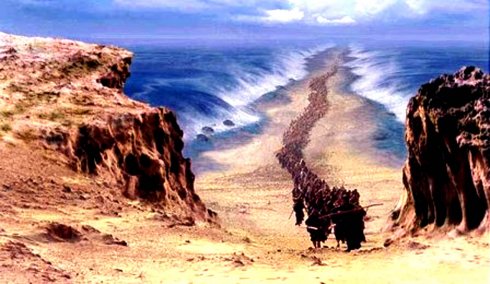 Imagine a Parting of the Atlantic Ocean Instead...
Imagine a Parting of the Atlantic Ocean Instead...
Sorry, No Short-Cuts
When Israel was led our of Egypt, everyone doubtless expected that they would be taking the shorter coastal route rather than heading into the barren wilderness of Sinai and having to cross a body of water too. Of course we all - that is, the fleshy part of us - want to take the easy route but that is almost never how a people is purified. This is one reason currently this is not the end-time Great Tribulation for we need a far longer time to die to our false religion and worldly ways. If it took paganised Israel 40 years to have it burned out of them, what makes us think it will take any less of us? But rather than face up to this painful truth that will require sacrifice and surrender, the mdoern generation would much rather embrace an easy escapist rapture myth that requires nothing of them other than to 'believe' and carry on as before. However, not only will they discover the Enemy on top of them in the Outer Courtyard but no sudden rescue or whisking away. Of course they won't believe this message until the 'rapture' fails to materialise and even then the lazy and carnal will keep on hoping for short-cuts that never come. Then many will fall away because they were taught a false gospel that did not bring the expected dividends.
Conclusion
Of the 32 elements of Moses' life which we can expect to be repeated in some form or another in the 12 latter-day Moses-men we have covered about 6 or 7. Some of the others we will be able to cover relatively quickly as I focus on what I believe to be the more important ones. Next week we shall resume this study and hopefully conclude it. May Yahweh the Elohim (God) of Abraham, Isaac, Jacob, Joseph and Moses in the meantime bless you all in Yah'shua the Messiah (Jesus Christ) as you ponder these things until we meet again next week. Amen.
Continued in Part 3
Endnotes
[1] Gardiner, Journal of Near Easter Studies, XII: 1953, pp.145-149, especially p.149
[2] H.Brunner, Altšgypische Erziehung:1957, pp.32-33
[3] W.F.Albright, Bulletin of the American Schools of Oriental Research, 110:1948, pp.12-13,22
[4] William H. Sanford, The Complete Messianic Alep-Tav Scriptures - Paleo-Hebrew Edition (CCB Publishing, British Columbia, Canada: 2014)
[5] W.Spiegelberg, Recueil de Travaux, XIV:1894, p.64
[6] See our website on Celibacy
[7] Ungodly ones are a curse to the Body because they exponentially multiply the failure of unsuccessful monogamist marriages - most of them (men and women) are never called, yield to baser instincts because they never had the Shem Tov required of those called to this supernatural lifestyle
Comments from Readers
[1] "Your sermon for this morning is actually a confirmation of the things we are currently experiencing and what [the] Ruach has shown us. We are in full agreement on this. Shalom!" (FVS, South Africa, 26 November 2015)
[2] "Hello Pastor Chris, I hope you are doing well. I did a reading of your recent 2 part sermon. Since you sent it to me early, I thought I had better take a look as soon as I could, but I needed to re-read last week's sermon too. Wow. What can I say.....Thank you for sharing and for your obedience. First of all, I was unable to concentrate and read it all the way through... What I do in this instance is go back and forth between other material or take frequent breaks. While reading, I had another tab open with pictures of headcoverings that I was going to buy. As I reflected on the meaning of headcoverings for women, and finished looking at various selections, I clicked back to the sermon, and then I scrolled to the possible picture of Moses' first wife from Cush/Kush. Whoa!!! And look at how her head was covered! Confirmation for me about what the Lord is leading me to do about headcoverings in my own life. Plus, here is some confirmation about the presence of people who look like me in the salvation story. I am struggling beyond words about what to do and feeling safe in the midst of heightened racial tensions here in the US.....It was comforting to see her picture on some level.....I realize that there are no favorites in God's Kingdom but......sometimes I fret because of who seems to possess all the right knowledge, power, and property in the US.....and globally to an extent.....Okay....I keep reading the sermon and then I get to the part about Gershom and Elieazar, Moses' sons. I thought to myself, wait a minute, I never knew that Moses had children, and then I open up another tab and start searching about them. I ask myself, how in the world did Moses avoid any domestic problems with his calling? Then, as I ask that question, I go back to the sermon, and scroll down to the part of the sermon where you write about Moses' challenges on the homefront, and what this means for Yah's chosen leaders....Wow! Things just seemed to flow with each question I had about Yah's revelation.....I have to go back again and process your points more deeply of course, but I thought you might find it interesting how the Spirit was speaking to me as I was reading the sermon..." (MM, USA, 25 November 2015)

|


